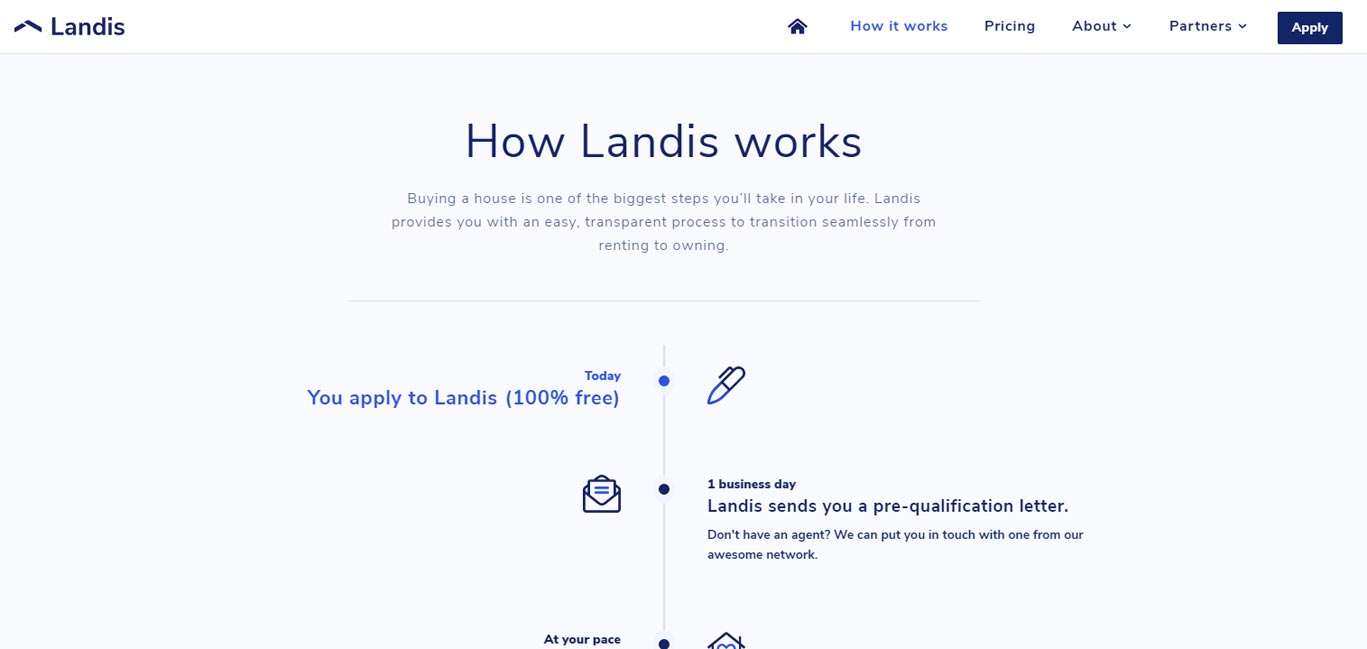Compare Landis.com and Sold.com
For Sellers
For Buyers
Answer: Landis.com is a rent-to-own program that does not provide real estate services while Sold.com is a referral fee network that enables broker-to-broker collusion with use of blanket referral agreements
Buying with Landis
Landis is a rent-to-own program that purchases the home and then rents it out to you as a tenant. Landis claims to operate a one-year program for the tenants to buy the property once they can afford a down payment. A common complaint with all rent-to-own programs is an inability of the tenant to secure a loan in time to purchase the property, at which point the tenant is either forced to walk away with a loss or continues to rent.
Landis may sometimes suggest that a customer reach out to someone (e.g. a lender) who can help them, but the company doesn’t make money from it, and only gives the info to the customer, not the customer's info to anyone else. Landis does not receive any referral fees from third parties (such as lenders, real estate brokers, etc.) and keenly guards customers' information. This is a refreshing approach that adds value to consumers. Landis states that: "companies at our stage don't have any incentive to charge hidden fees: growth and customer experience simply matter much more than revenue."
Landis Pricing
Landis revenue comes from the price of rent and a 3% increase between the price of the home when Landis buys it and the price it sells it to the tenant after a year.
Landis is silent on what happens in a situation when the price of the home drops before the tenant can buy it, or if the mortgage rates increase during the tenancy period. When consumers use Landis, they are unable to take advantage of a buyer’s commission rebate from a real estate agent because the company is the one actually buying the home.
Landis states that it receives "no rebates or commissions from agents, we pay agents their full commission, as though they were working with the customer."
When it comes to the cost of rent Landis says that "we're very upfront with our users that during the 12 months of the program, we are more expensive than owning, or even renting. That's because we need our customers to put money to the side for their down payment … our only revenue is market rent and 3% appreciation at the end of the year. The economics work out because we're in areas where average rents are high."
Listing Services
- This Service Does Not Represent Sellers
Buyer's Agent Services
- This Service Does Not Represent Buyers
Landis.com Editor's Review:
Landis program purchases the home and rents it to the tenant with an option to buy. Landis reviews full financial, credit, and work history of each potential tenant. Those few applicants who pass the screening may select a home within the allowed amount Landis sets. A tenant pays rent, a portion of which becomes a down payment to eventually buy the home. After a year, if the tenant decides to move out, Landis deducts half of the down payment amount saved, as an added fee. When purchasing a house from Landis, a tenant must and pay closing costs of the sale.
Landis has only enough cash on hand (structured as debt) to place offers against a handful of properties. This is why the company likely rejects the majority of applications as a way to reduce risk. It is safe to assume that only a very small number of applications with Landis are approved.
According to the company, "lenders send us customers that want to buy a home but can't close on a loan. It could be due to a low credit score, insufficient down payment, a recent bankruptcy, self-employment, or some other reason."
To secure a mortgage on competitive terms is a primary and the best option to buy a home. Yes, the down payment is difficult, but adding Landis to the mix doesn't solve the overall affordability. Landis claims that owning a home is always cheaper than renting it, but Landis is a landlord.
There is nothing to substantiate that renting a home from Landis is less expensive to own it during that same time frame. There is also nothing to suggest that Landis is offering reduced rent to the tenant at any given time. Buying a property is a risk, and Landis must account for this risk with added fees. The true costs of this rent-to-buy program are incredibly difficult to estimate by anyone other than Landis, and these costs are absolutely real.
Buyers are unlikely to receive a buyer's rebate from a real estate agent when buying with Landis program.
Buying a home is one of the most important transactions in people's lives, especially the first home. By adding Landis rent-to-own proposition, buyers are subjecting their transaction to the additional 3% appreciation fees, paying rent, and a possible loss of half of the down payment amount if moving out.
Landis receives a neutral editor's score because of several factors. When asked, the company declined to disclose its application volume and applicant success rates. Lack of this information makes it difficult to estimate the “weight” of overall operations and the returns the company is required to make against the total number of participants.
An undisputed positive is that the company doesn’t make money from referrals, making their claims to hold consumers’ best interest viable.
Landis claims that owning in the long term is cheaper than renting, especially in the markets where it operates. However, there is no clear evidence money is saved and there is no evidence that consumers who choose the Landis model end up with a higher chance of purchasing the home.
Landis states: “We completely agree that a mortgage is better. That's why we coach all our customers to do what they need to get a mortgage. It's the whole point of the company. We work with those who simply can't get a mortgage (because of credit score, down payment, etc.) and we coach them to fix what prevents them from getting one. As soon as they can get one, they graduate from the program.”
We find no solid evidence that Landis offers home buyers tangible savings as part of their rent-to-own program, but at the same time, some home buyers may decide for themselves that the program is worth the added fees.
Geodoma editorial staff remains overall neutral on the subject: we can neither recommend Landis nor suggest that buyers refrain from using the program.
Where does Landis.com operate?
Selling with Sold.com
WARNING: Unlawful Kickbacks, Broker-to-Broker Collusion, False Marketing, Wire Fraud, Price Fixing.
Sold.com) is a broker-to-broker collusion scheme, where "partner agents" unlawfully agree to pay massive kickbacks to receive your information and engage in market allocation, consumer allocation, false advertising, unlawful kickbacks, wire fraud, and price-fixing practices in violation of, inter alia, 18 U.S.C. § 1346, 18 U.S.C. § 1343, 15 U.S.C. § 1, 15 U.S.C. § 45, 12 U.S.C. § 2607, 12 C.F.R. § 1024.14. As a consumer, you will always significantly overpay for Realtor commissions subject to hidden kickbacks and pay-to-play steering promoted in this scheme.
United States federal antitrust laws prohibit consumer allocation and blanket referral agreements between real estate companies.
Be smart; do not allow your information to be "sold as a lead" to a double-dealing Realtor in exchange for massive commission kickbacks paid from your future home sale, or your future home purchase.
Sold.com is a referral fee network designed to collect fees by matching consumers with local real estate agents willing to participate. Sold.com operates as a licensed real estate brokerage in California under BRE License #01937601, but it does not produce any services that are typically offered by real estate agents and does not represent consumers when selling real estate in any State.
When consumers submit information to Sold.com, this information is simply sold to real estate agents who are willing to pay for it with a 30% share of their commission.
Sold.com Pricing
Sold.com revenue comes from referral fees.
Listing Services
- This Service Does Not Represent Sellers
Buyer's Agent Services
- This Service Does Not Represent Buyers
Sold.com Editor's Review:
On paper, Sold.com seems to have a great idea – to provide its users with the best way to sell a home, but in reality, it is a referral network designed to steer consumers toward agents and other services willing to pay a cut of their commission back into the network.
Sold.com states that it is an “unbiased” and consumer-focused service, but the actual model turns out to be much less effective - Sold.com is a California licensed real estate broker that collects a 30% referral fee from all real estate agents that participate.
This fee makes it hardly a free service for anyone since referral fees are inevitably passed down to consumers. More importantly, Sold.com applies this pay-to-play bias towards all matching results, meaning, only real estate agents that have agreed to pay a referral fee are displayed in match results for consumers.
Sold.com audits all transactions because it needs to find out how much money real estate agents receive in commissions, inevitably collecting private details of consumer’s agreement for home purchase or sale.
Sold.com plays fees down to consumers - it states directly that the service is 100% free, but at the same time, it rigidly locks every participating real estate agent into 30% referral fee attached to the back-end of every contract. As a licensed real estate agent that doesn’t perform any real estate services or takes any responsibility for the transaction, it is not entirely clear how this process works under the Business and Professions Code and RESPA.
Clearly, real estate agents only sign-up with Sold.com because the price of the referral fee can be easily incorporated into their client's agreement with excessive commissions. Sold.com receives the second lowest score because this service is clearly biased and it claims to provide the complete opposite of what it actually does.



